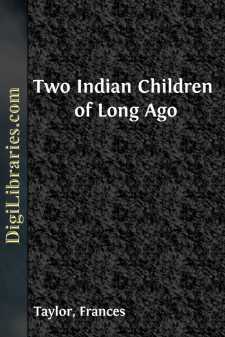Categories
- Antiques & Collectibles 13
- Architecture 36
- Art 48
- Bibles 22
- Biography & Autobiography 813
- Body, Mind & Spirit 142
- Business & Economics 28
- Children's Books 17
- Children's Fiction 14
- Computers 4
- Cooking 94
- Crafts & Hobbies 4
- Drama 346
- Education 46
- Family & Relationships 57
- Fiction 11829
- Games 19
- Gardening 17
- Health & Fitness 34
- History 1377
- House & Home 1
- Humor 147
- Juvenile Fiction 1873
- Juvenile Nonfiction 202
- Language Arts & Disciplines 88
- Law 16
- Literary Collections 686
- Literary Criticism 179
- Mathematics 13
- Medical 41
- Music 40
- Nature 179
- Non-Classifiable 1768
- Performing Arts 7
- Periodicals 1453
- Philosophy 64
- Photography 2
- Poetry 896
- Political Science 203
- Psychology 42
- Reference 154
- Religion 513
- Science 126
- Self-Help 84
- Social Science 81
- Sports & Recreation 34
- Study Aids 3
- Technology & Engineering 59
- Transportation 23
- Travel 463
- True Crime 29
Two Indian Children of Long Ago
by: Frances Taylor
Description:
Excerpt
THE FIRST AMERICANS
We are proud of being Americans. But we must not forget that the Indians once owned all America, north and south and east and west.
The Indians were the first Americans of whom we read. No people ever had a greater love for their land, and no race has ever taken more pleasure in out-of-door life.
After Columbus found the New World, white men came from Europe to make their homes here. As time went on they drove the Indians farther and farther west and took away their hunting grounds.
Let us try to imagine our country as it was when the Indians owned it. Can we picture our land without a house or a store or a railroad? Can we think of great rivers with no cities on their banks and with no bridges on which to cross from one side to the other?
Every boy we know likes to go camping. But who would be willing to set up a camp far away in the deep woods without taking with him tent or food or blankets?
Before trade with the white men began, the Indians found everything they needed in the wild land about them. They could make their own weapons and tools, their canoes and paddles, their houses and clothing, and even build a fire without matches.
Your fathers leave home to earn money for your food and clothing. Your mothers see that your meals are cooked and that your clothes are bought or made.
The Indians took care of their children in much the same way. During the hunting season the fathers and big brothers went away every morning to hunt. The men provided all the meat for their families, and all the skins for clothing and covers.
When a deer or a bear was shot, the hunter brought it to the camp and threw it down. His work for the day was done—the women could do the rest.
And it was wonderful to see what the wives and mothers could do with a big animal. Was there a wigwam in the tribe without food? The meat was shared to the last mouthful. Was there an abundance? The meat was dried for long keeping.
Did the son need more covers for his bed? A bear's skin was finished like a fur rug for his comfort. Did the black-eyed daughter beg for a new dress? Her mother could make from the deerskin a soft garment beautifully trimmed with colored beads, stained quills, and fringes.
But what did the Indians do when they could find no more game to shoot with their arrows? Why, they sent out scouts to select a better place to live, and the chief gave orders for every one to move.
Down came the lodge poles. The trained dogs were called and loaded, and away they all went. Just think of a whole village moving and leaving nothing behind but the land!
The Indians spent much time in feasting, dancing, and games. During the summer the men had little else to do, for they seldom hunted while the wild animals were caring for their young.
Each tribe was ruled by a chief and a council of warriors. All their lands were held in common, and no one suffered want except when food was scarce for all.
Every boy was watched with interest by the whole village. His first walking was noticed, and his first success in hunting was often celebrated by a feast.
...

